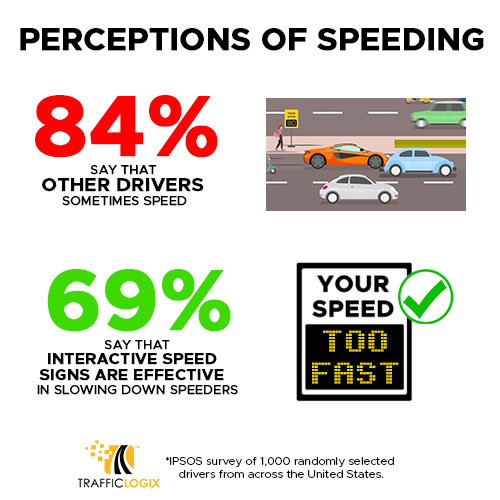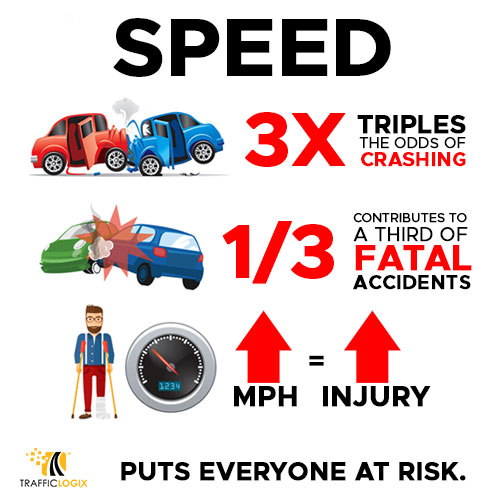
New Study Highlights Driver Perception of Speeding
By Devorah Werner, Content Strategist at Traffic Logix
The fact that too many people are losing their lives on our roads is indisputable. And cities everywhere are working to improve safety and prevent accidents with top-down approaches like Vision Zero and traffic calming programming. But what about bottom-up consideration? How much do we really know about what drivers think of their own speeds and others?
Every traffic engineer has an opinion of how safe our roads are or aren’t and what works to make them safer. But what do drivers think? Do they think other drivers usually obey speed limits? Are they aware of their own speeds? Are they responsive to driver feedback signs and other smart technologies or resentful of their interference?
Traffic Logix recently conducted an IPSOS survey of 1,000 drivers representing a cross section of Americans of all ages, incomes, and genders to explore some of these questions. Here’s what the survey found.

Speed Limit Compliance
When asked if they thought speed limits were being observed by other drivers in their neighborhood, only 16 percent of respondents thought they were always followed. Almost all drivers (84 percent) felt that others were speeding some of the time. In contrast, close to half (43 percent) of respondents felt that speed limits were never or almost never obeyed.
It seems the average driver doesn’t think that people follow speed limits on their roads.
Does it matter if people aren’t following speed limits?
Speed limits are certainly enacted for a reason. They take factors into consideration such as road type, location, and users. Research has shown that speed limit increases were tied to more than 37,000 fatalities over a 25-year period.1
Speeding puts everyone at risk. It triples the odds of crashing, contributes to a third of fatal accidents, and increases the risk of injury with every increased mile per hour.
It seems that the average driver is under the impression that others are often not following speed limits. Would it follow that drivers are aware that they are also prone to speeding?
Self-Awareness
The survey found that a surprising 62 percent of drivers feel that they are always aware of their speeds. A staggering 91 percent of drivers say they are sometimes or always aware of their speeds.
So drivers seem to think that they are aware of how fast they are going. But are they?
Are drivers aware they are speeding and choosing to speed anyway? Or do they mistakenly think they are obeying speed limits while they have lost track of how fast they are going or what the posted speed limit is?
Whether drivers are mistaken about their speeds, unaware of speed limits, or speeding in spite of them, solutions such as driver feedback signs have been shown to improve awareness, decrease speeds, and positively impact driver behavior. 2 But how do drivers feel about these types of technologies? Do they see them as helpful, useless, or interfering?

Speed Interventions
Most of the drivers surveyed (69 percent) felt that interactive speed signs and other smart technologies are effective in slowing drivers down some or all of the time. Only 9 percent of drivers thought that these technologies are never effective.
Evidently, drivers are open and responsive to tools that increase awareness on their roads. Interestingly, of those surveyed, drivers with college degrees and those who work full time were more likely to see these solutions as effective.
Distracted Driving
Distracted driving is a huge issue on today’s roads that puts everyone at risk. However, with increased focus on distraction, it’s easy to let concerns about speeding fall to the wayside.
Engineers and city officials need to be careful not to ignore the real and ongoing risk posed by speeders. Around 10,000 people lose their lives every year in speed-related crashes.3 Slowing speeders and making drivers more aware of speed limits and their own speeds is crucial in protecting our roads.
Armed with the knowledge that drivers are aware that others don’t follow speed limits, think they are aware of their own speed most of the time, and are open to driver responsive signage to slow cars down, engineers can work to create safer streets for everyone who uses them.
References
- IIHS. “Speed limit increases are tied to 37,000 deaths over 25 years.” April 4, 2019.
https://www.iihs.org/news/detail/speed-limit-increases-are-tied-to-37-000-deaths-over-25-years - Traffic Logix. “How Traffic Calming Works.” https://trafficlogix.com/how-traffic-calming-works/#Effectiveness
- National Highway Traffic Safety Administration. “The Dangers of Speeding.” https://www.nhtsa.gov/risky-driving/speeding
Devorah Werner is the Content Strategist at Traffic Logix, a traffic safety company that designs, manufactures, and sells solutions for safer roads. She researches and writes articles and web content about the company’s goals to protect today’s streets and everyone who uses them. She helps to position the company’s messaging as well as to promote their family of solutions and how they help cities to reduce speeds, prevent accidents, and save lives.